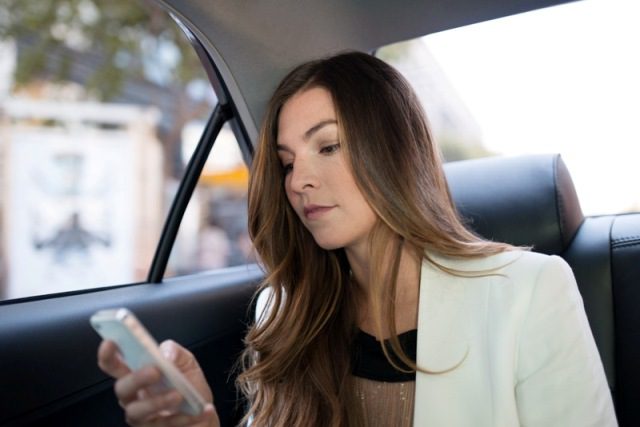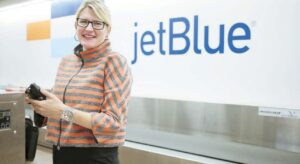
Uber, Lyft and others are in big trouble as California and AGTA calls the ride share companies out on being a liability risk
The battle between traditional transportation and young new upstarts, such as Lyft and Uber, in cities has headed to the airport and it’s no vacation.
Yesterday, July 10, Transportation Network Companies, better known as Lyft, Uber and its siblings, were given a stern warning by the Airport Ground Transportation Association. The warning follows the Public Utilities Commission of the State of California’s warning and threat to revoke UberX’s, whose parent company is Raiser, permit to operate in the state.
Ray A. Mundy, Ph.D., executive director of AGTA, told the companies that they are exposing airports to legal risks by unlawfully transporting customers to and from airports, he warned.
What does this mean to the car service that is popular among women?
If the car service companies don’t comply it looks like it’s back to cabs, shuttles and gawf! busses and subways to get to and from the airport or make like an outlaw.

Uber Outlaw
Many women might not realize that they are already playing the outlaw role when they take UberX or Lyft or any of the similar app-run car services to or from the airport.
In California, the app run car services have operated legally since the state’s PUC approved UberX’s permit to operate Sept 19, 2013.
These car service companies are also allowed to operate legally in Colorado.
Yet, in spite of the Golden State’s stamp of approval, state and transportation officials claim that these car services are operating outside of the law and putting customers at risk, because UberX and its siblings’ blatant lack of compliance with airport and city rules and regulations.
The issue has heated up to the point that the CPUC threatened to revoke UberX’s permit to operate in California in a June 10 letter to Garrett Camp, a representative of UberX.
Michael R. Peevey, president of the CPUC, placed UberX under random audits by the agency’s investigative unit.
The AGTA’s warning comes on the heels of officials at San Francisco International Airport asking California’s Public Utilities Commission for assistance with bringing the TNC’s into compliance with transportation safety rules and regulations at airports and a warning by the CPUC to UberX on June 10.
The CPUC gave UberX two weeks to come into compliance or to provide a written response that the airport authorities’ claims were unjust by June 17, but it is unknown if UberX responded. It appears that the car service hasn’t complied.
Uber Unsafe?
Why is California coming down on the app driven car service that people seem to love? The companies aren’t complying with safety rules, such as running background checks, conducting driver trainings, carrying proper insurance and permits, and more all the way down to drivers possessing valid driver’s licenses.
Uber agreed to follow these regulations when the CPUC approved its permit more than a year ago. Yet, the permit doesn’t include airport permits, which airport authorities require and grant themselves. Since California airports and many across the nation haven’t granted permits to Uber and other new car service companies they are running amok of the law each time a driver drops off or picks up a passenger.
Many travelers don’t know this but most airports are property of local cities, so Uber and it siblings are in violation of more than just airport laws but also city ordinances and even state laws.
Failure to comply with the state regulations is a misdemeanor in California authorities’ eyes under the state’s Public Utilities Code, Michael, pointed out in a May 9 letter to Garrett.
This new call for UberX, Lyft and its siblings to get with the program in terms of carrying insurance and holding the proper permits is an extension of the battles happening in the heart of cities that are attempting to bring these companies into line.
Eva Behrend, a spokesperson for Uber, disagrees with the CPUC and AGTA’s claims that Uber doesn’t have proper insurance coverage, since Uber launched in 2013 it has “put industry-leading insurance policies in place to cover every ridesharing trip on the Uber platform throughout the U.S.”
“We are actively working with airport managers and their staff to help develop requirements that are aligned with CPUC regulations and embrace the spirit of ridesharing,” says Eva, responding to our request late Friday.
Representatives of Lyft didn’t respond to Girls That Roam’s request for comment by press time.

Tisk, Tisk Uber
“Since the issuance of the CPUC’s decisions we have heard numerous complaints that these safety rules are being ignored,” wrote Michael in the letter.
Authorities at state’s airports, three of which located in UberX’s hometown the San Francisco Bay Area, and the two others Los Angeles International and San Diego International airports, raised some of the issues with Michael in an appeal for the state’s assistance with the problem.
Michael expressed disappointment as he relayed the issues to Garrett in the letter.
In the year following the state’s stamp of approval not only had the companies not filed for proper operating permits, but numerous complaints have been filed against them by airport authorities. San Francisco police officers found in just a brief three week period – April 16 through May 5 – that UberX is the biggest violator with 101 drivers out of 110 operating illegally. Lyft followed with 7 drivers operating illegally with SideCar and Wingz, which operates under Tickengo, with 1 driver each in breaking the law.
Authorities at Los Angeles International have given out up to 60 citations within the past three weeks, reported eTurbo News.
Back at SFO, when police officers told the CPUC that when they issued warnings to TNC drivers 300 of the drivers didn’t have a permit from airport authorities, weren’t carrying proof of insurance on them, weren’t displaying their “trade dress” on their cars, were seen transferring apps and cars among drivers, and two drivers didn’t have valid driver’s licenses, according to the letter.
When asked about these issues, police discovered that the drivers weren’t aware that they were breaking the law and were required to carry a permit to pick up passengers at the airport, Michael informed Garrett.
“For the protection of the airport and the safety of the airline traveling public, airports must insist that they be named as co-insured on a primary liability policy for every commercial vehicle operating on airport property,” says Ray.
Ray adds that companies such as Uber and Lyft “continue to serve the airports without assuming any of the liability and costs of doing so.”
Dave Sutton, spokesperson for the public safety initiative ‘Who’s Driving You?’ agrees.
“Here is another example of Uber and Lyft creating risk for other entities by operating unsafely and without proper licensing,” Dave told eTurbo News. “States and cities that allow Uber and Lyft to operate without proper insurance and background checks may be exposed to litigation resulting from accidents caused by these so-called ‘ridesharing’ drivers. Uber and Lyft are exposing airport authorities across the country to the same type of risk.”
California airports aren’t the only ones running into liability issues with the app car services. Drivers of the car services are receiving citations, each with a $1,000 fine plus impound fees, for not having proper permits at airports across the country, reported the travel news source.
Authorities at Hartsfield-Jackson Atlanta International, George Bush Intercontinental, McCarran International, Miami International, Logan International, O’Hare International, Pittsburgh International have issued citations to app driven car services.
The risk is so clear and present that eighteen states, plus the District of Columbia, have issued warnings to consumers that the insurance involved with companies such as UberX and Lyft is unsafe and inadequate, reported the travel news source.

Airport Blacklist
Is UberX and its siblings getting a fair shake? Part of the problem is that UberX, Lyft, Wingz and Summon, which operates under InstaCab, didn’t receive a permit package from the airports until April 7.
Why so long airports? That’s about a year and a half after the CPUC granted a permit?
More than a month later, May 9, none of the app car services applied for a permit, but drivers simply continued to bring passengers to and from the airports as they have been.
This led John L. Martin, airport director at SFO, to believe that Uber and others will continue operating in “willful disregard” of CPUC permit requirements, he wrote to Michael in a plea for help that he believes in May.
John asked the CPUC to order the car services to remove SFO from its area of service, inform the CPUC of its compliance of this request, and to public display an announcement of halted service to customers on its website until further notice.
Uber and other car services haven’t appeared to have done any of these things. It is unknown if it was a discussion between airline executives and airport law enforcement personnel from five of the states’ major airports, including all three Bay Area airports, and Uber executives during a meeting June 4.
At the meeting officials laid out the issues and presented documentation of their concerns to UberX executives.
Six days later Uber received the CPUC’s warning letter.
Is Uber Taunting Authority?
Like any new upstart companies like Lyft and Uber are bucking the system and literally thumbing their nose at the rules, according to Ray and other airport authorities and officials.
These companies intend to challenge airports by continuing to operate at airports their way and challenging airport officials to stop them, Ray believes.
“As we have seen in city after city, these companies have lobbied hard for officials to not apply regulations to them ‘as we work out the details,’” says Ray, pointing out that these companies have stated, “Airports are our next battle ground.”
AGTA is calling companies like Lyft and Uber to task for sidestepping the rules at airports. Representatives of AGTA plan on discussing TNCs extensively, covering legal, social, insurance/safety, and economic aspects of working with TNCs, at its fall conference in Phoenix, September 14 – 17. At that time representatives will also update members and others on what is happening with TNCs.
Until then Lyft, Uber and other app-run car services aren’t publicly responding to the controversy.
FlightCar
In other car share news FlightCar, the airport park and rent your car while you travel company, and SFO settled on an agreement to operate, reported ABC 7 News July 10.
After refusing to pay airport fees and taxes and being booted out of SFO, the upstart personal car rental service agreed to pay SFO 4% revenue from its sales for an impact fee, among other terms. In turn, SFO is allowing passenger transport from FlightCar’s new South San Francisco digs at 240 Dollar Avenue.
Do you take Lyft or Uber to the airport? What do you think? Do you believe that ride share services, such as Lyft and Uber, should hold proper insurance and permits like other airport transportation services to operate at airports?
Note: Updated July 11 at 7:38 p.m. with Uber’s response to a request for comment.
To book your next vacation, contact Heather Cassell at Girls That Roam Travel at Travel Advisors of Los Gatos at 408-354-6531at or .
To contract an original article, purchase reprints or become a media partner, contact ">editor [@] girlsthatroam [.] com.







